L.A. Weekly columnist Nikki Finke has startled the film world with a gut-punch quote from producer and longtime Steven Spielberg loyalist Kathy Kennedy that Munich (Universal, 12.25), which Spielberg directed and Kennedy produced, “could be his best.” The quote comes from a friend of Kennedy’s, who adds that Kennedy “wasn’t talking that way about War of the Worlds.” First, War of the Worlds was a pretty good film (except for the last ten minutes with the dipshit happy ending) so anyone who uses that film as an example of a big Spielberg miscalculation or letdown is a suspicious source to start with. Second, anything that Kennedy says about Munich (regardless of any perspective provided by Finke’s source) is obviously not to be trusted. Third, as I noted a couple of weeks ago, the Munich trailer strongly indicates that above and beyond the procedural aspects (Mossad agents out to kill the Palestinians who perpetrated the 1972 Munich Olympic Games masscare), it’s mainly going to be a guilt-trip movie with Eric Bana’s Mossad operative lamenting about his team having killed some innocents and the possibility of his daughter loving him less if she ever finds out, etc. The insect-antennae reading around town is that Munich will probably be pretty good, but that’s all. If it turns out to be much better or even masterful, fine…but I doubt it.
 Jeffrey Wells
Jeffrey Wells
The comic tone of Lasse
The comic tone of Lasse Halstrom’s Casanova (Disney, 12.25) isn’t exactly “farcical,” which, for some of us, means humor that’s cloddishly broad and frequently unfunny. Casanova‘s alchemy is more subtle; it’s selling laughs through the filter of a certain subdued old-world lunacy. It almost feels as if Hallstrom and his cast were on mescaline when they shot it. Does Casanova feel as whimsically stoned as Richard Lester’s The Three Musketeers? Maybe not, but it’s a very close relation. I saw it earlier this week and concluded right afterwards it’s the most satisfying Lasse Hallstrom film since….I was going to say My Life as a Dog but let’s hedge a bit and say What’s Eating Gilbert Grape?. Ledger plays the legendary Venice cocksman with just the right portions of sincerity and insincerity…a very delicate brew. Costars Sienna Miller, Lena Olin and Jeremy Irons more than hold their own, but Oliver Platt gives the biggest standout performance as the pot-bellied Papprizzio. (A friend who just saw it in Sydney told me this morning he felt “more emotionally invested in Platt’s buffoon than Ledger’s Casanova.”) While I’m on the subject, the MPAA’s ratings board has again passed down an idiotic decision in giving this mildy frothy comedy an R rating because of a simulated oral-sex scene. My kids told me three or four years ago that oral sex is a total so-whatter among eighth graders (at the school they were attending in Tiburon, at least) so you’d have to think that kids who are 12 and 13 and 14 thesed days would barely raise an eyebrow at simulated off-screen oral sex in a film. Sorry, parents, but we’re no longer living in a Wonder Years world. A PG-13 would have been more than sufficient.
That rumor about Terrence Malick’s
That rumor about Terrence Malick’s The New World (New Line, 12.25) having been shot in 70mm is only a little bit true. They used 70mm film only twice during the shoot, for FX shots. 70mm used to be a gold-standard way of shooting a prestige film (the clarity of image on older 70mm films like Lawrence of Arabia is ummistakable), but no longer because 35mm has become so light-sensitive and technologically tuned-up.
Stephen Gaghan’s Syriana (Warner Bros.)
Stephen Gaghan’s Syriana (Warner Bros.) opens today with a 75% positive Rotten Tomatoes rating. I haven’t yet written my piece about it, but despite what you may be hearing about the narrative being a little oblique for some viewers, this a riveting and deliciously cynical geopolitical drama for the ages. The best people have been speaking about it in reverent tones over the last two or three weeks, and its reputation is only going to grow as the years advance…and for good reason. I did a pretty good phone interview with Gaghan last Saturday, which you can hear by clicking on the “archives” file right under the site’s Elsewhere Live ad. And read this review by senior critic Kenneth Turan. I totally agree with everything he says here, and he says it very well.
The town is shutting down
The town is shutting down for Thanksgiving already. Five days of friends-and-family kickback time (and a chance to catch up with all the movies and DVDs I’ve been putting off seeing) is about to begin. A friend sent me a “have a Happy Thanksgiving” note this morning and I replied, “I’ve been a Turkey-McNuggets-on-Thanks- giving guy for years, and the notion of holiday respite is a joke given the relentless demands of this column…but thanks for thinking of me, [name], and I hope you have a heathwarming time on Thursday as well.” The same sentiments are hereby passed along to the readership.
I love Chris Columbus’s Rent,
I love Chris Columbus’s Rent, but it has a 47% Rotten Tomatoes rating so all right, okay…I’m clearly in the minority. But at least William Arnold of the Seattle Post-Intelligencer likes it and the Hollywood Reporter‘s Kirk Honeycutt is seriously supportive. And the New York Times‘s A.O. Scott is also, to his admitted surprise, a fan. “The lyrics to one of its frenetic, show-stopping songs celebrate the idea of ‘being an ‘us’ — for once — instead of a ‘them’,” Scott Begins, “and the world around Rent may be similarly divisible, into those viewers whose hearts beat faster as soon as the lights go down [on a production of Rent], and those whose heads begin to ache before the first note has even sounded. Approaching the film adaptation, which reunites most of the original Broadway cast to belt out Jonathan Larson’s lung-stretching songs about love, art, real estate and AIDS, I was inclined toward the latter category. Two hours later, I was pleased (and somewhat surprised) to find myself an ‘us’, for once, instead of a ‘them’. Some aesthetic objections still stand…but every time the film seemed ready to tip into awfulness, the sneer on my lips was trumped by the lump in my throat. [Columbus] as taken a source that is fiercely and jealously loved by its core fans and refrained from messing it up. It is not just that he shows dexterity and imagination in transferring the spectacle onto the actual streets of the East Village in Manhattan. The real key to his success is his utter lack of condescension. Rent is nothing if not earnest…it believes in itself utterly [and] is occasionally silly, often melodramatic and never subtle. Openhearted to a fault, it stakes its integrity on the faith that even in millennial New York, some things — friendship, compassion, grief, pleasure, beauty — are more important than money or real estate. But to chide Rent for its childish politics or its simplistic and instantly obsolete vision of the New York demimonde is to think like a ‘them’.”
Man From Decency
Man From Decency
Every now and then you need to take a break from all the Hollywood crap, and I got a really nice one last Saturday from an encounter with former U.S. Senator George McGovern. In so doing I felt an emotion that I haven’t had much contact with lately. I felt a kind of familial love.
The occasion was an early-Saturday-evening showing at Laemmle’s Music Hall of Stephen Vittoria’s One Bright Shining Moment: The Forgotten Summer of George McGovern, which I’ve been trying to catch since last July or so, when I happened to see a poster for it in the lobby of Manhattan’s Quad Cinema.
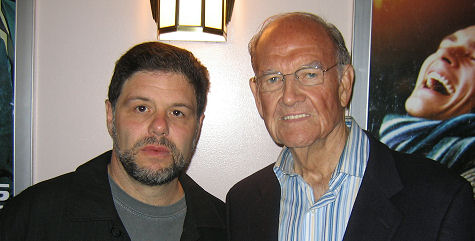
Stephen Vittoria, director of One Brief Shining Moment, and George McGovern in lobby of Laemmle’s Music Hall — Saturday, 11.19, 8:23 pm.
I’ve always admired McGovern, the longtime South Dakota liberal who’s mainly known for his catastrophic run as the Democratic President candidate in 1972 against President Richard Nixon. Hurt by a campaign that was chaotically mana- ged but also unlucky, McGovern got less than 40% of the vote and took only two states, Massachucetts and the District of Columbia.
I’ve long respected McGovern for having thetorically guided the last plain-spoken, genuinely liberal Democratic Presidential campaign. But my affection has mainly been about a long-held feeling that profound currents of decency and compassion run within him.
< ?php include ('/home/hollyw9/public_html/wired'); ?>
It sure felt that way as he spoke to a middle-aged crowd that had just seen Vittoria’s film around 7:30 pm, and later as he posed for photos and signed autographs and whatnot in front of the theatre on Wilshire Blvd.
He’s 83 now and seems to be in excellent health — tanned, trim — and he told the crowd he wants to live to be at least 100. He needs that much time, he said, to accomplish all his goals, which include doing what he can to eliminate hunger in third-world countries.
He’s been the World Food Program’s first global ambassador on hunger since ’01, and before that served as U.S. ambassador to the U.N. Food and Agriculture Agencies, based in Rome, Italy, from ’98 to ’01.
He said that his favorite line in Vittoria’s doc is when Gloria Steinem says that looking back on the ’72 campaign, the McGovern loyalists have a lot more to be proud of than do the supporters of Nixon’s campaign, who have all that Water- gate-related skullduggery to contend with.
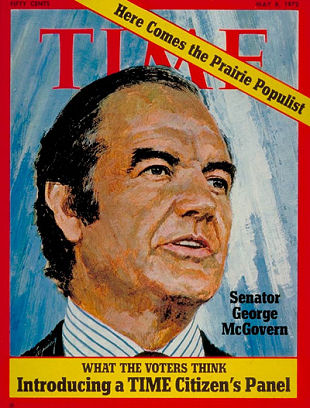
Salon‘s Andrew O’Heir recently wrote than “when the long lens of history finally focuses on McGovern’s contentious era, he’ll appear in the main text, named as a prophet, while Nixon will be a twisted king consigned to the footnotes.”
But when asked last Saturday evening what he thinks about the present White House occupant, McGovern said he’d rather have Nixon there.
Nixon, he pointed out, was fairly practical and forward-thinking on domestic issues and the economy. He created the Environmental Protection Agency, advocated gun control, imposed wage and price controls, etc. And he wasn’t indebted to the neocons and their absolutist agendas.
The talking heads in One Bright Shining Moment include McGovern, Steinem, Gore Vidal, Warren Beatty, Howard Zinn, Dick Gregory, Gary Hart, Frank Mankiewicz, Jim Bouton, Rev. Malcolm Boyd and Ron Kovic.
Vittoria’s film is, for my money, a little too admiring, strident and one-sided. I wish he’d talked to some conservatives and maybe even a former enemy or two. It would have given the film some added intrigue without compromising McGovern’s image.
Some liberals still flinch at the memory of the ’72 campaign, but when a man has lasted as long as McGovern has and consistently stood for caring and compassion in public afairs, what’s not to admire? We’re speaking of one of the most steadily principled men to succeed in big-time politics in the 20th Century.
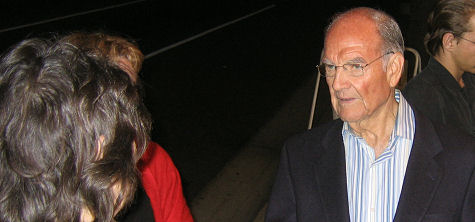
McGovern and admirers on sidewalk in front of Laemmle’s Music Hall on Wilshire near Doheny — Saturday, 11.19, 8:25 pm.
The Village Voice‘s Michael Atkinson has complained that Vittoria’s doc is filled with “exactly the sort of starry-eyed, bullet-spraying hyperbole that drains credibility from any brand of political discourse,” adding that it “may be useful as home-front history, if only it didn’t rant, yowl, and wet its pants so much.”
Still, it’s a good thing to have a film out there that doesn’t just train your attention on who George McGovern really is and was, and what his campaign was all about, but which pays the proper respect.
One Bright Shining Moment: The Forgotten Summer of George McGovern has been moving from city to city since its New York debut on 9.16. It doesn’t appear to have played a lot of the big liberal cities — San Francisco, Portland, Seattle, Chicago, etc.
The distributor, First Run features, is obviously operating on a shoe-string, but you’d think they’d at least manage to get it booked in the above-named cities and get it seem by as many devoted lefties as possible before the DVD debut in April ’06.
USC Interlude
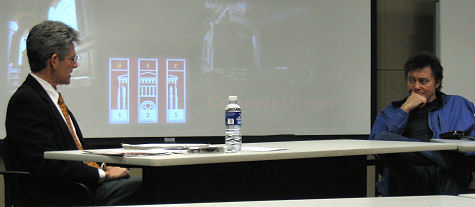
Ain’t It Cool’s Drew McWeeny and yours truly paid a visit Monday night to Charles Fleming’s “Entertainment, Business and Media in Today’s Society” class at the USC School of Journalism. We talked about internet journalism, industry politics, survival skills, the shortcomings of Tom Rothman and what the students think about the hot new movies. Defamer’s Mark Lisanti, profiled in the current issue of Los Angeles magazine, was supposed to show but bowed out at the last minute….something about his girlfriend having told him they already had “plans” (does that sound like a crock or what?). Thanks to Fleming (pictured at left with the suit and tie) for having us down.
White Eyeballs
As everyone presumably knows, I spend a lot of my spare time thinking up new ways to rip Peter Jackson. I’m kidding, but seriously…this is not one of those articles.
This is about a significant difference between Jackson’s King Kong — the big digital simian we’ll soon be seeing on the big screen — and Merian C. Cooper and Willis O’Brien’s classic stop-motion, herky-jerky version.
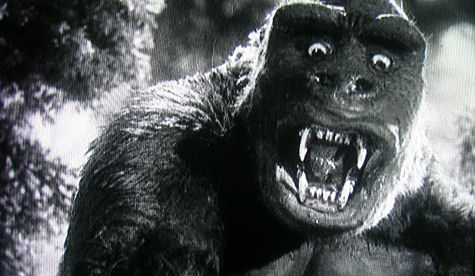
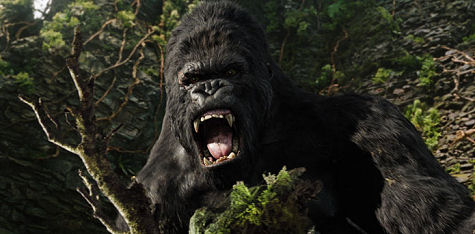
When this hit me the other day I was so excited I almost had to pull over and stop the car. The odd thing is that Jackson and a couple of his model-and-visual-effects guys talk about this very issue on the making-of-King Kong doc on the just-relea- sed Warner Home Video DVD of Cooper’s 1933 film.
I’m not saying Jackson has made the right or the wrong call in the fashioning of his own Kong, but stills from King Kong (Universal, 12.14) make it clear that his version is modelled pretty closely on the shape and musculature of real gorillas.
There may be some creative interpretation but compare Jackson’s ape with the shot [see below] of a Dianne Fossey gorilla…okay? Same deal. Grayish brown coat, big long Popeye arms, stubby hind legs, brown eyes.
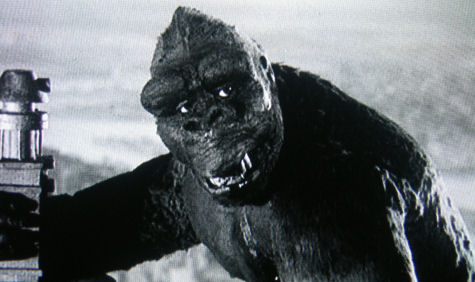
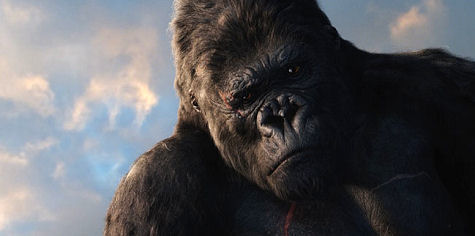
Cooper’s Kong didn’t look like any gorilla, chimp or orangutan that had ever walked the earth. He was something between a prehistoric hybrid and an imaginary mon- ster of the id…a raging nightmare beast designed to scare the bejeesus out of 1933 moviegoers.
O’Brien, the legendary stop-motion phtography pioneer, used three slightly different-looking Kong models during filming, but for me the master stroke was deciding to give his Kong a set of gleaming white teeth and a pair of very bright white eyes.
In some of the darker shots of Kong in the 1933 film those teeth and those eyes just pop right out, and the effect is still primal as hell. Those white eyes and black pupils look so fierce and almost demonic…contrasting as they do with that black bear fur that Kong was covered in…that they almost give you the willies, even now.


Judging solely by the stills, there’s no such aura with Jackson’s National Geogra- phic Kong. The realism element is awesome but the guy doesn’t look all that spooky. I mean, not even a little bit. Ferocious and all, but he makes me think of Michael Apted and Sigourney Weaver.
There’s anothing wrong with this approach. It is what it is, and Jackson is going for his own thing. The stills and the trailer clearly suggest that his Kong is going to be one of the richest visual banquets in monster-movie history, if not movie history itself.
But in going for anthropological realism Jackson has thrown out that creepy, better-than-reality, only-in-the-movies element that gives the 1933 film a little- boy’s-nightmare quality.
Step On It
Rob Marshall’s Memoirs of a Geisha (Columbia, 12.9) is this year’s model of the big bland Best Picture contender that everyone who isn’t a sucker for this kind of thing — expensive, beautifully produced, Oscar-hungry, terminally boring — needs to throw tomatoes at.
Seriously…let’s start the ball rolling now. IM your friends and coworkers and tell them you’ve heard it’s a tedious costume-movie drag, but also that it’s caught a certain headwind and there’s a slight chance it could metastasize into this year’s Chicago.
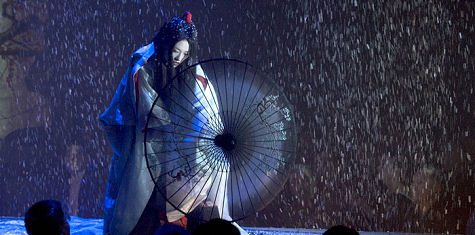
Ziyi Zhang during her big geisha-in-a-snowfall performance number that has zip to do with her character but a lot to do with Rob Marshall’s creative sensibility
The best thing about it is Gong Li’s performance as a jealous-bitch geisha in a Bette Davis mode. Otherwise the film is all costumes and pretty photography and a rags-to-riches story that creeps along at a petty pace.
It’s porcelain, nothing, stupefying…and every Godforsaken line of Chinese-accent English-language dialogue is like screeching chalk.
The first Academy-member Geisha screening happens tonight (11.21) so no pulse- readings until tomorrow, but there’s a poll of nine connected journos that just went up today on Movie City News called “Gurus of Gold,” and Geisha is being project- ed as one the top five Best Picture contenders.
Two of the respondents — Variety guy and Maxim critic Pete Hammond and USA Today‘s Scott Bowles — are actually projecting it as the most likely Best Picture winner…at this juncture.
The stars of Memoirs of A Geisha are Ziyi Zhang, Michelle Yeoh and Gong Li… three famed Chinese actresses played Japanese geishas and speaking English …and the feeling of Hollywood fakery and retrograde attitudes is fairly relentless.
The same Anglos-first mentality that led to the casting of Marlon Brando as Sakini in The Teahouse of the August Moon (’56) and Ricardo Montalban as Nakamura in Sayonara (’57) has prevailed once again.

And at no point does Memoirs of a Geisha feel like anything more than a colorful but perfunctory corporate tour of an exotic culture, tailor-made for Disney World Americans who won’t pay to see movies with subtitles.
I can tolerate the three Chinese actresses playing Japanese (although Ziyi doesn’t look Japanese for a second, and there’s a clear genetic difference in the faces of the two peoples), but the language and accent barriers are impossible.
Marshall should have shot a Japanese-language version concurrently, which Columbia could have concurrently released into select big-city theatres. Difficult but not impossible, and then people like me would have had an easier time of it.
There’s a scene early on in which a pair of young sisters are about to be forcibly separated. A very traumatic thing, but if this were to happen in real life the sisters would be in such shock they’d probably whimper a little bit and spend most of their last few seconds just staring at each other. Not in Rob Marshall’s world. When Geisha‘s sisters are torn apart the more spirited of the two goes, “Noooooo!!”
That’s a bullshit Hollywood reaction. People in bad Hollywood movies always go “noooo!!” when something bad happens. In a way, the whole movie is like this one scene. I didn’t believe a word of it.
And I wonder if the women for whom it’s been made will either. And I doubt if any real critical support will manifest. A publicist friend tells me all the journos he’s spoken are saying “pretty to look at, but cold.”
Robin Swicord and Doug Wright’s script is based on Arthur Golden’s 1997 novel, which is a huge international best-seller. I think it’s safe to say that the movie will dampen interest in anyone who hasn’t yet read it wanting to do so. My God, who would want to take this journey twice?

Ziyi Zhang, Ken Watanebe
Set in Japan in the 1930s and ’40s, Geisha is essentially a Cinderella story, and there’s not a hint of story tension or rooting interest in any part of it.
A little Japanese girl (Suzuka Ohgo) who will eventually be called Sayuri is sold to a geisha house (called an “okiya”), kicked around and treated like a slave. She’s quite pretty as an adolescent and is considered a special standout because of a pair of very weird-looking blue eyes (which throw you completely out of the film because they look like dopey contact lenses, pure and simple).
And then she grows up to be Ziyi Zhang, who doesn’t resemble Ohgo in the slightest.
This much-celebrated 26 year-old actress gives her first nothing performance here. She brought a fierce glaring passion and a taut physicality to her roles in Crouch- ing Tiger, Hidden Dragon and Hero and found a sense of emotional truth in Wong Kar Wai’s 2046, but here she’s a piece of wood.
Gong Li wields a much sharper blade as Sayuri’s wicked geisha nemesis Hatsu- momo. She’s stuck in the same mediocre Rob Marshall movie, but there’s fire in her veins and the heat burns through, and right away she has you thinking impure thoughts.
Sayuri, in any event, is trained to be a geisha and soon gets into an ongoing generational cat-fight with the older Hatsumomo. Her ally is Yeoh’s Mameha, a 40ish geisha playing a stock older-mentor character, dispensing sage advice with the usual kindly-patient smile.
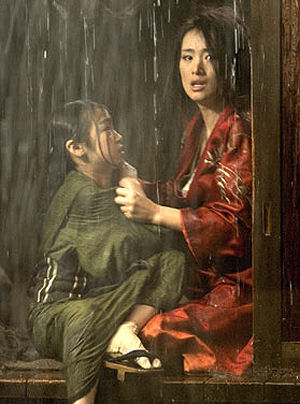
Suzuka Ohgo (l.), Gong Li
Eventually Sayuri meets Prince Charming in the form of a businessman called “The Chairman” (Ken Watanabe) and falls for him. The usual hurdles and compli- cations have to be overcome before Watanebe finally recognizes what a treasure she is and tells her he loves her.
I think I was a little happier than Sayuri was when this happened.
The most irritating performance is given by Kaori Memoi, who plays the crusty and conniving Mother, the head of Sayuri’s geisha house. Her English is so bad and so grating I literally twitched in my seat at one point.
The movie stays with the explanation in Golden’s novel about what being a geisha is all about, which is that geishas are in no way prostitutes and are more about being a very refined form of arm candy…a poised and disciplined ideal of Japanese femininity.
And yet somehow, despite all the talk about no sexual favors, Sayuri and Mameha end up doing some nocturnal skinny-dipping with a bunch of Japanese business- men and an American colonel (Ted Levine) in the third act.
A Japanese businessman admirer of Sayuri has asked her to cuddle up to the American Colonel so he get get a business deal out of him, and when Levine’s character makes a move a few minutes later Sayuri is shocked and offended.
This is ridiculous, and another reason I didn’t believe what the film was selling. Geishas are not hookers, okay, but all my life I’ve been told that carnal knowledge is sometimes part of the equation. You just have to be the right guy with the right attitude, the good manners of a gentleman and a lot of money.
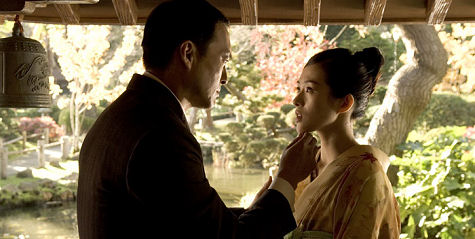
No one will argue with Geisha getting the usual below-the-line nominations that are always handed to a film of this type. Dion Beebe’s cinematography, John Myhre’s production design, Colleen Atwood’s costumes and John Williams’ score are all topnotch. What the hell, throw in nominations for the editor and the sound editing guys.
Geisha was mostly shot in the Los Angeles area (an outdoor Japanese village was built north of the city), including the Sony soundstages in Culver City. That means a lot of local people were paid top dollar, which tends to produce in the minds of Academy people an urge to reciprocate in the form of handing out Oscar nomina- tions in the less-important categories.
But classy window-dressings aren’t enough to justify nominating a film for Best Pic- ture. The above-the-line nutrition in Memoirs of a Geisha simply isn’t there, and no amount of cheerleading by its supporters is going to change that fact.
Memoirs of a Geisha star
Memoirs of a Geisha star Ziyi Zhang “looks like a virtual shoo-in for a [Best Actress] nomination, and the early leader for the statuette,” writes Tom O’Neill on the L.A. Times-funded site, “The Envelope.” Really? On the basis of what? It can’t be her acting, so this must be about Academy members believing that giving “Zi” a nomination would inject an element of graciousness and good manners in the relationship between Hollywood and the Chinese film industry. I like to show love as much as O’Neill does, but Zhang’s performance ranges the gamut of emotions from A to B…she’s stiff, constrained, and awkward with the English dialogue. O’Neill also claims that the buzz on Geisha “says a best pic bid looks inevitable.” Like I said in my 11.21 piece, Geisha might get lucky because of the undeniable quality of below-the-line contributions, but all over town people burdened with a sense of taste are rendering the same verdict: pretty images, but no real soul or fire or poetry generated from within.
“The era of moviegoing as
“The era of moviegoing as a mass audience ritual is slowly but inexorably drawing to a close,” proclaims L.A. Times film industry columnist Patrick Goldstein. He repeats the standard observation about the business having been “eroded by many of the same forces that have eviscerated the music industry, decimated network TV and, yes, are clobbering the newspaper business.” Then comes the Sobering Statement: “Put simply, an explosion of new technology — the internet, DVDs, video games, downloading, cellphones and iPods — now offers more compelling diversion than 90% of the movies in theaters, the exceptions being Harry Potter-style must-see events or the occasional youth-oriented comedy or thriller.” Comments from industry solders about an ongong “bloodbath” aside, this doesn’t portend an end to the movie business. It merely projects a revenue shift. The industry professionals who’ve been living fairly high on the hog based on real or perceived theatrical-revenue income (stemming from themselves, their films, their clients, etc.) are either going to have to (a) weedle their way into the new markets or (b) live and be happy with slightly less in the way of cash, savings, travel, perks and freebies. Life is hard…life is a scramble.
The slump is not a
The slump is not a myth, as this Hollywood Reporter/Reuters story explains: “Because ticket prices have increased slightly, estimated admissions for the fall present a bleak picture. Estimated ticket units were 208.1 million, down nearly 8% from the 223 million reported a year earlier and well shy of the record 268.3 million rung up in 2003. And with overall year-to-date sales running behind the year-ago period by nearly 7% — which translates to a deficit of around $550 million — it will be up to the films of the seven week year-end holiday period to close that gap.” I’ve said myself many times that admission totals are the bottom line, and here it is in black and white.
A good interview/career analysis piece
A good interview/career analysis piece on Brokeback Mountain star Heath Ledger by Time‘s Belinda Luscombe (“Heath Turns It Around”). It reminded me of what I wrote hours after seeing Brokeback in Toronto, which was that between that and Ledger’s then-upcoming Casanova, he has saved his career. The 26 year-old Australian tells Luscombe that he pretty much decided to kill his movie-star persona after A Knight’s Tale, a film which made Ledger feel he was being sold and packaged as a slicked-up commodity. The result of Ledger’s Sean Penn-ish career stratgey since then was that, with the exception of Monster’s Ball, all the films he’s made have been critically slammed or strick out at the box-office, or both (Four Feathers, The Order, The Brothers Grimm, Lords of Dogtown). “Even if [Brokeback Mountain] pulls in crowds only in New York City, South Beach and San Francisco,” Luscombe writes, “it has redeemed Ledger from being a pawn — or even a knight — in the Hollywood chess game.”
So Time’s Richard Schickel respects
So Time‘s Richard Schickel respects Brokeback Mountain for its “its assault on western mythology [and] its discovery of a subversive sexual honesty in an unexpected locale,” but feels it loses steam as it goes along and “finally fails to fully engage our emotions.” Odd how reactions can vary so greatly. For me the ending — the last 20 minutes especially — is the part that ties it all together and finds the primal emotional chord.
